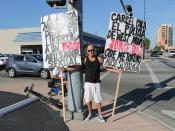Introduction
The role of the journalist is pivotal in reporting sex offence cases. It's critical to understand that the media and the press in particular make and break reputations, sensationalize issues and create moral panics. This we know and when it is concerned with sex offences the press are always assured to be controversial and to some extent, some would believe, over the top. But as McNae quotes, "the media are the eyes and ears of the public" (McNae, 1997). With this it is possible to state that they should be able to report exactly what the public want to know and hear.
There is already a list that is monitored by the Government to know where sex offenders will be. "Under the Sex Offenders Act, those found guilty of crimes such as rape are obliged to report their name and address to a local police station within 14 days of their conviction."
(BBC Online, 2000). Is this not enough to prevent them from carrying on? Letting the public know just causes unnecessary problems and outrage, as is made clear later in this essay.
Described by the Home Office, "If offenders are being managed and monitored by the relevant professional agencies the risk they pose is minimised. The risk to the public is greatly increased if public attention forces offenders underground." (BBC Online, 2000).
The Role of the Journalist
It's clinical to understand the role that the journalist must play in sex offence cases. They must be careful not to go too far in reporting a case and as hard as it may be, they should always try to remain balanced up until any verdict has been given.
There couldn't be a more perfect and more topical argument than that of the accused killers of Holly Wells and Jessica Chapman. Now, this is something I feel very strongly about. Due to the press we know a lot about these people, Ian Huntley and Maxine Carr. Where they grew up, where they live, their past, their connection to their victims etc. However they are yet to be accused. Is there not something fundamentally wrong with this system? These people are yet to be sentenced. I know, in this particular trial it is less likely, but there is still a distinct possibility that they could be innocent. On the chance that that verdict may be given, they will be set free into a society that will never accept them for as long as they live. Even though they have been found guilty, people will always associate them as the killers of those two little girls and their lives will never be the same because the press has it in their rights to publish information in abundance about them before they have been sentenced. There have been examples in the press in the last year or so that back this up. The case involving the Hamiltons where a lady accused them of sexually assaulting her put them under the media microscope. They were found innocent but there are many people out there who will always think, did they or didn't they? The recent case involving Paul Burrell is another example. He was too found innocent but whenever he is in the public eye, some may refer to him as that poof who used to try on Princess Diana's clothes. It's morally wrong but simply a fact of life.
It's not wrong of those people, it's wrong of the media and it's a necessary tool to require the law to be changed.
Moreover, there will always be arguments for the press to back the outing of paedophiles. "Police, lawyers, parents and the media all have a role to play in countering child sex abuse and a cooperative and coordinated effort is vital to successfully reducing this problem." (www.aiu.gov.au)
Problems of Naming and Shaming
"There is no longer any restriction on naming the defendant in a rape case or other sexual offence case under the 1992 Sexual Offences Acts and any direction made to ban such identification is obviously invalid." (McNae, 1997).
At the time it seemed that the naming and shaming campaign was a good thing. It brought a sense of national togetherness, the idea that we could strive to boot out the peadophiles amongst us as it were. The News of the World projected it into a national debate but with it brought actions that would project the campaigns flaws as much as it's plus points.
It spiralled out of hand. As with many of the press's projects it created a national uproar which would spark controversy and dramatic scenes from the public. It provided a clear example that the more people know about what is happening around them, the greater the fear is instilled. There is this demand for the truth but it can be pushed too far. We don't need all the facts.
"Naming and shaming can also tar the innocent" (BBC Online, 2000). For example, after the campaign there were various attacks on people who merely looked like the offenders which had been seen in the paper. On the day that the list was published the home of a man in Manchester was surrounded by a three hundred strong crowd shouting obscenities. Not only that but a window of a neighbouring house belonging to his ex-wife was also smashed with a brick. All of this because of the fact that he wore a neck brace that made him match the look of a paedophile in the paper. Surely these actions are a substantial enough to suggest that naming and shaming is wrong. Plus, it's the type of thing that would constantly happen. People would get mistaken for others, innocent people's lives would ultimately change because of it, it's just a vicious circle. An argument that was also backed up by the Scottish Executive who opposed plans for anti paedophile websites. "We would lose ability to track paedophiles, putting children at greater risk." (BBC Online, 2000).
In addition to this is the problem and the recovering of old memories to victims. "One officer in Yorkshire told of an adult victim who came to him angry and drunk, threatening to kill the man who abused him. 'Prior to this he had been dwelling less on the past and his drinking was more controlled but this has set him back'." (BBC Online, 2000)
Some victims may agree that it's in the past and that it should now be left alone. They don't want to know anything about their offender. As well as this, it's also possible that naming and shaming could lead to the identity of the victim. It's part of the law that the victims' identity should never be made public but because many are related to their abusers. "Giving the name of the defendant could lead to identification of the victim in some cases where other detail is given." (McNae, 1997). And papers can also get it wrong, as they so frequently do when an issue is sensationalised. "Failure to remember that complainants must not be identified has lead to a number of newspapers being prosecuted." (McNae, 1997). It's putting two people's lives through hell, again.
It's easy to say that the offender deserves everything he gets. However, there is this notion that you do your crime and then your time. As the quotes from BBC Online state, "For society there can be no difference between someone who gets sexual gratification from the act of murder and someone who gets sexual gratification from acts with children."
When can we decide that someone no longer carries a threat? If papers such as the News of the World continue to publish names of convicted peadophiles from thirty years ago people will never be able to move on.
In Britain there is a register containing the details of sex offenders which the public don't have access to. They don't need access, everything is dealt with by the authorities and if this is abused then the system will never be concrete which makes the situation worse. In 2000, Acop issued a statement saying, "Treatment and assessment programmes are being disrupted and compliance is being threatened."
If papers continue to name and shame offenders under probation will no longer comply with the rules and regulations of the register. The movement, effectively known as going underground, means that offenders move away from their home area, change identity and break contact with the services. This is by no means safer, instead exactly the opposite of what the public want. However, it is their campaign, driven by the press that causes it.
The paper cited a man who committed a sex offence at the age of nineteen, it was thirty three years
previous to the publication. It was known that he was unlikely to reoffend but because memoirs of his past had been dug up, he was said to be suicidal over fears of being identified in the paper. Conversely some prisoners were reluctant to participate in treatment programmes that had been set up especially for them to become better people and not to reoffend. This reluctance was perfectly reasonable - what would be the point if they were simply going to be 'outed' on their release? It was a problem underlined by Police Inspector Harry Thorburn who said, "This high profile media campaign is a difficult one and I have yet to see the evidence of how it has worked." (BBC Online, 2000). In the Midlands, it was also heard that vigilante groups told police that they intended to use violence to drive out the sex offenders. "The law must strike a balance between the public interest in exposing wrong doing and the individuals right to have his reputation defended from malicious and baseless attacks." (McNae 1997)
Should the law be changed?
Tony Butler from the Association of Chief Police Officers says, "We have the most successful sex offender register of any country in the world." Again, surely this is enough to assure people's safety. The register contains 12,000 names with a compliance rate of 97%. A person knowing more adds to their fear. There is this demand for the truth but it can go too far. The government knows where they are on this issue; they deal with it as they see it and it is successful as the facts prove. Problems begin to arise when you have MP's such as Tory Richard Shepherd suggesting that the UK should adopt Megans Law. This was the first real high profile case that introduced naming and shaming in America. After the death of Megan Kanka, a 7 year old schoolgirl, the state pushed through laws to circulate details of paedophiles to schools and youth organisations.
Paeodophiles are out there but they are being monitored. An interesting point to note is that while all the attention is focused on paedophelia, it is actually a fact that whereas "5 to 9 children die from sexual assaults each year in England and Wales", (www.forsarah.com)" around 80 are killed each year by parents"(www.nspcc.org.uk) .If this is the case, there's enough reason to suggest that there should be a naming and shaming list of parents throughout the country who assault their kids. As the question refers, it isn't just peadophiles that should get this treatment, if at all. If people who murder can become free members of society again then so should paedophiles.
Despite this, there are some paedophiles who remain elusive and this brings in arguments supporting naming and shaming. There are still a number of paedophiles that are repeat offenders. Due to difficulties in the detection, investigation and prosecution of offences against children, some offenders run very little risk of being convicted. "Paedophiles tend to engage in predictable sexual activity and their past history is likely to be a good indicator of future behaviour." (www.aic.gov.au).
Conclusion
Although there are arguments for naming and shaming to be stopped, BBC Online's comment about the News of the World printing half-naked teens is slightly misleading. It's not as if they're printing pictures of little kids, against their wishes in some perverse way. The girls in these pictures have chosen to be there, they want to be pictured, whether it be for money, it is still their choice. The News of the World wants to sell papers and the inclusion of this will attract buyers. In addition, this topic is one which is traditionally recognised in the press. It's taken very casually and isn't a big deal. Naming and shaming is and comparing the two is a far-fetched argument.
This idea of wanting to sell papers however, was an issue at the time of the campaign. It was thought that the 'For Sarah' was simply a way of selling papers as "the News of the World has been known to pull stunts for coverage before." (BBC Online, 2000). This is an issue I hate to address but such the world that journalism is it is a possibility. But then if this is the case, what kind of world am I entering myself into? Do I want to be a party to such scandalous ideologies?
"Our critics say that the job of watching paedophiles is best left to the public services. We say the authorities have tried very hard, but 64% of paedophiles still re-offend." (News of the World 2000).
Naming and Shaming is definitely an example to suggest that the law needs to be altered. The public needs to have some awareness but the extent to which was demonstrated by the News of the World is not the correct way to achieve this.


